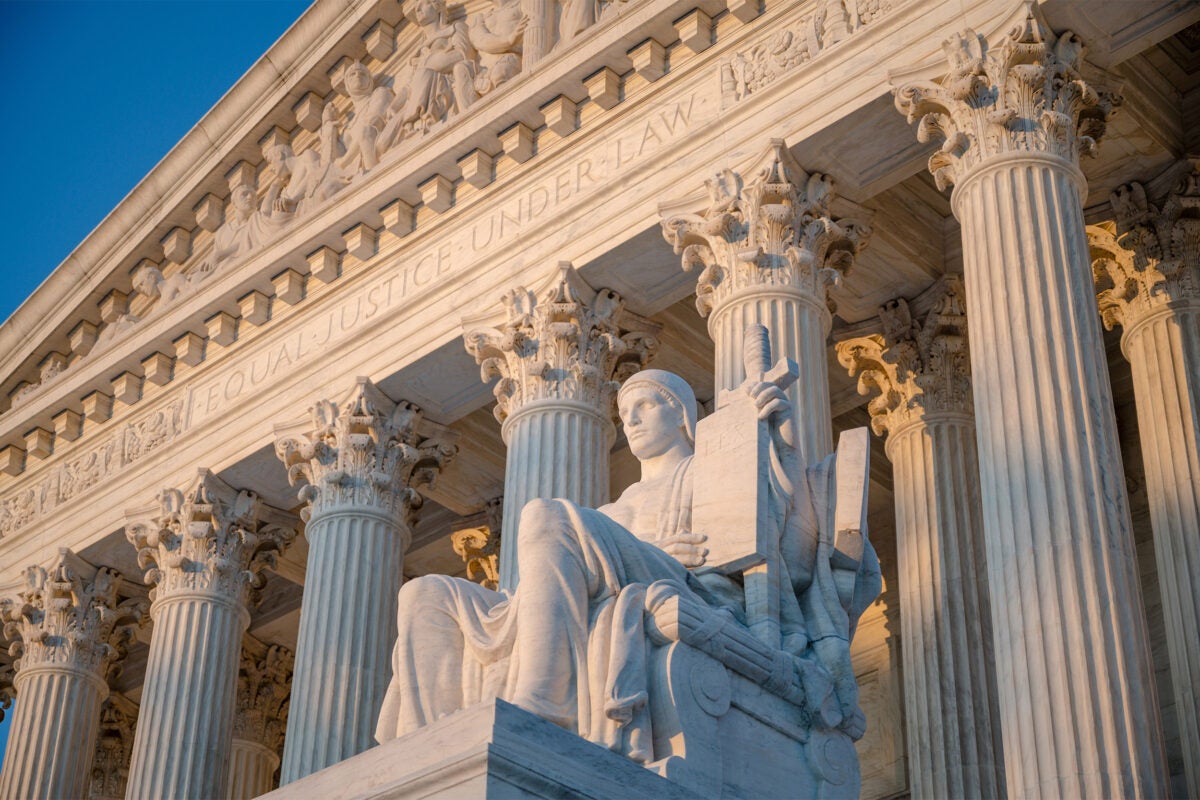Supreme Court to hear Harvard admissions challenge

“Harvard will continue to defend vigorously its admissions practices,” President Larry Bacow responded.
Sharrocks/iStock by Getty Images
Decision could upend four decades of legal precedent allowing use of race as factor in decisions, alter higher education in U.S.
BY Colleen WalshHarvard Staff Writer
DATEJanuary 24, 2022
The U.S. Supreme Court announced Monday it would hear oral arguments likely this October in a lawsuit challenging race-conscious admissions policies at Harvard and the University of North Carolina. The outcome of the case could dramatically alter higher education in America.
The justices agreed to take up the question of whether Harvard, and colleges and universities across the country, can continue to use race as one factor among many in their admissions processes. In its announcement, the Court said it would hear the Harvard case in tandem with a similar lawsuit brought against the University of North Carolina at Chapel Hill.
Both a federal district judge and a federal appeals court previously found in Harvard’s favor in the case that was launched in 2014 by Edward Blum and the organization he created, Students For Fair Admissions. The Supreme Court has upheld the use of race as one factor among many in admissions since the landmark Bakke case in 1978 and as recently as 2016.
In a statement, Harvard President Larry Bacow said the Court’s decision to take the case threatens decades of legal precedent. He insisted Harvard will continue to defend its admissions process in pursuit of a diverse campus, one central to the University’s educational mission.
“The Supreme Court decision to review the unanimous decisions of the lower federal courts puts at risk 40 years of legal precedent granting colleges and universities the freedom and flexibility to create diverse campus communities. Considering race as one factor among many in admissions decisions produces a more diverse student body which strengthens the learning environment for all,” he said. “The U.S. Solicitor General rightfully recognized that neither the district court’s factual findings, nor the court of appeals’ application of the Supreme Court’s precedents to those findings, warrants further review. Harvard will continue to defend vigorously its admissions practices and to reiterate the unequivocal decisions of those two federal courts: Harvard does not discriminate; our practices are consistent with Supreme Court precedent; there is no persuasive, credible evidence warranting a different outcome. The University remains committed to academic excellence, expanded opportunity, and diverse educational experiences—and to the perennial work of preparing students for fruitful careers and meaningful lives.”
The Court’s decision to move forward sets the stage for a final legal showdown in a process entering its eighth year. The Court first deferred a decision on whether or not to take the Harvard case last June when it asked Solicitor General Elizabeth B. Prelogar, the Biden administration’s chief litigator, to “file a brief in this case expressing the views of the United States.” In December Prelogar urged the Court not to take the case, citing the lower court rulings and Supreme Court precedent.
The case was first tried in 2018. Federal District Court Judge Allison D. Burroughs found in favor of Harvard in her October 2019 decision on all counts, ruling that the College didn’t discriminate based on race, engage in racial balancing or the use of quotas, and that it had no suitable race-neutral alternatives that would allow it to achieve its pedagogical and diversity-related goals. Just over a year later, in November 2020, the First Circuit Court of Appeals upheld Burroughs’ decision.
Material from previous coverage has been used in this report.
Yesterday, the Supreme Court announced a decision that could put forty years of legal precedent at risk. Colleges and universities could lose the freedom and flexibility to create diverse campus communities that enrich education for all. Our admissions process, in which race is considered as one factor among many, makes us stronger. It prompts learning in day-to-day exchanges in our classrooms and laboratories, in our residential houses, and on our playing fields and stages. Our students understand these truths and see them reflected in their interactions with their classmates. Diversity opens our eyes to the promise of a better future.
Harvard celebrates and nurtures individuality as intensely as this nation. Those who challenge our admissions policies would ask us to rely upon a process far more mechanistic, a process far more reliant on simple assessments of objective criteria. Each of us is, however, more than our numbers, more than our grades, more than our rankings or scores. Ask yourself, how much have you learned from other people at this University? How much have you grown from conversations across difference? Would these conversations have been as rich if you had shared the same interests, the same life experiences, and—yes—the same racial or ethnic background as your fellow community members? This is why applications of any kind routinely go beyond mere numbers to include interviews, samples of work product, recommendations, and references. Narrowly drawn measures of academic distinction are not the only indicators of individual promise.
As the Supreme Court has recognized many times, race matters in the United States. I long for the day when it does not, but we still have miles to go before our journey is complete. Harvard will continue to defend with vigor admissions policies that were endorsed in the thoughtful decisions of two federal courts that concluded that we do not discriminate; our practices are consistent with Supreme Court precedent; there is no persuasive, credible evidence warranting a different outcome. Though I wish yesterday had turned out differently, I remain confident that the rule of law—and the respect for precedent that perpetuates it—will prevail.
Sincerely,
Larry
© 2022 The President and Fellows of Harvard College | Harvard.edu
Harvard University | Massachusetts Hall | Cambridge, MA 02138
No comments:
Post a Comment